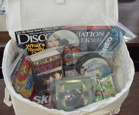Care packages may be sent up once or twice during a six-month period, and they are usually assembled from items sent from the astronaut's home or from the support staff.

The package is sent in a half-size cargo transfer bag (CTB) made of white Nomex fabric and 24.8 cm x 42.5 cm x 23.5 cm. The maximum load is 5 kilograms per crew member.
A NASA article goes into further detail on the content restrictions:
The bag is also restricted by content. Food is allowed. But, anything with significant crumbs -- such as potato chips and peanuts, depending on the packaging -- that can stray into the air, causing problems with computers and the ventilation, can't go. Homemade treats like cookies -- besides the crumb factor -- can't go, because they're perishable and their quality can't be monitored. Products containing alcohol -- not just alcohol to drink, but alcohol in perfume, aftershave, and mouthwash -- can't go into space, and neither can cans under pressure -- like shaving cream. Clothing can go, as long as it's 100 percent cotton. Certain electronics, like handheld video games, aren't allowed either, due to concerns about batteries (they have sparking potential) and off-gassing problems.
All objects have to be tested by engineers for off-gassing before being sent up.
As you can see in the picture, each item is sealed in a flight-certified plastic zipper bag before it is placed in the CTB.
It isn't specifically addressed, but I would wager that the friends and family of the crew are allowed to submit enough to fill up the package--and that the support staff adds where that is lacking. Though the article does mention that there are certain occasions (like holidays) where psychological support scientists fill the bags with, for example, decorations for Christmas.
Sources:
